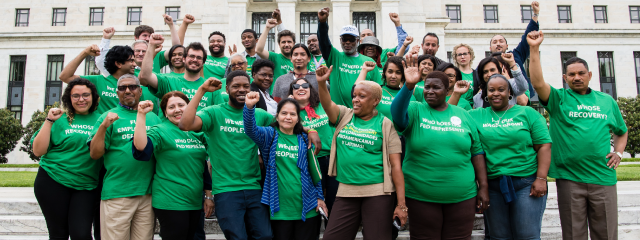Workers Tell Congress Why We Need a Fair Workweek

Last month, hourly service workers from CPD affiliates United for Respect and One Pennsylvania called on Congress to guarantee a fair workweek and combat the last-minute scheduling practices that make it impossible for workers to thrive. At the same time, CPD amplified new data illustrating how erratic and unpredictable workweeks hurt families and perpetuate racial inequality. These events made headlines in The New York Times, Vox, CNN, Fortune, Maine Beacon, and other outlets. And just yesterday, Senator Elizabeth Warren reintroduced the legislation to help ensure that low-wage employees have more certainty about their work schedules and income. Check out and share powerful stories from workers here.
A few key highlights from our Fair Workweek actions last week include:
-
United for Respect leaders Brandy Powell and Jenny Allen participated in a Capitol Hill roundtable discussion with researchers, policy advocates, and Representative Rosa DeLauro (D-CT). During the conversation––which was hosted by CPD, United for Respect, the Washington Center for Equitable Growth, and the National Women’s Law Center––Brandy and Jenny shared how last-minute schedules make it hard to make ends meet and harms their children. Check out other powerful stories from workers here.
-
Following Jenny and Brandy’s testimony, on November 5, Rep. DeLauro and Senator Elizabeth Warren reintroduced a stronger Schedules that Work Act. The legislation will rebalance our lopsided workweeks by requiring companies to provide two weeks’ advance notice of work hours; compensate workers when their hours change at the last minute; guarantee adequate time between shifts to commute, eat, and rest; and give workers a voice in their schedules.
-
New national data illustrating the severe impact of schedule instability on workers of color and working families. In a survey of 30,000 retail and food service workers at 120 of the largest U.S. retail and food service companies, California researchers Daniel Schneider and Kristen Harknett found that an unpredictable work schedule raises the likelihood that workers will experience material hardship, including food and housing insecurity. Erratic work schedules also heighten children’s anxiety and behavioral challenges and perpetuate racial inequality, as workers of color, particularly women of color, experience more unstable work hours than their white coworkers at the same employer.
-
States and cities continued to take action to enact Fair Workweek legislation. On October 16, New Jersey Senate Majority Leader Loretta Weinberg announced her intention to introduce fair workweek legislation at a press conference with Make the Road New Jersey, United for Respect, Unite Here, SEIU, NJ Citizen Action, and other allies. On October 25, Rep. Rosa DeLauro, State Sen. Julie Kushner, and State Rep. Robyn Porter joined the Connecticut Working Families Party, activists, and scholars for a roundtable discussion about how unfair on-call scheduling practices have affected workers’ lives.
Workers across the country are rising up in support of a Fair Workweek. Watch and share our video to help us spread the word about a Fair Workweek and ensure all workers across the country have these protections!












